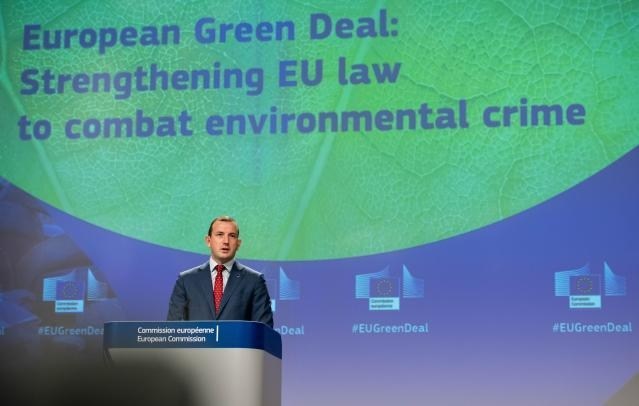The Commission adopted on Wednesday a proposal for a new EU directive on the protection of the environment through criminal law.
The proposal, accompanied by a Communication to the European Parliament and the Council, follows the publication in 2020 of the Commission's evaluation of the 2008 Environmental Crime Directive (Directive 2008/99EC). The results indicate that the number of successfully prosecuted environmental cases was low, sanctions were too insufficient to be a deterrent and cross-border cooperation was weak.
According to Interpol and the United Nations Environment Programme, environmental crime is the fourth largest criminal activity in the world after drug trafficking, human trafficking and counterfeiting, growing at a rate between 5%-7% per year, two to three times the pace of global economic growth.
In Europe, illegal trafficking in waste and in wildlife species, pollution crimes, and illegal trading in hazardous substances are among the most serious environmental crimes. Yet, the current rules do not deter these crimes effectively enough.
With the proposal, the Commission intends to make protection of the environment more effective by obliging member states to take stricter criminal law measures.
“Environmental crimes cause irreversible and long-term damage to people's health and the environment,” said Virginijus Sinkevicius, Commissioner for the Environment, Oceans and Fisheries (15 December). Yet, they are hard to investigate and bring before the Court, while sanctions tend to be weak. That is why we need to strengthen our environmental criminal law.”
The new law proposes a wider range of offences and an increased legal certainty by providing specific and clear descriptions of the criminal offences. Some of the offences are from the current directive, some are amended and clarified versions of existing ones, and some are new offences
Among the new offences are illegal timber trade, illegal ship recycling, illegal water abstraction from ground- or surface water, serious breaches of EU chemicals legislation, serious circumvention of requirements to get a development consent and to do environmental impact assessment causing substantial damage, and source discharge of polluting substances from ships.
At a press briefing today, the Commissioner said that there was no real penalty today for environmental crimes in Europe. Quoting Abraham Lincoln, who once said that, “Law without proper enforcement is just a good advice”, he underlined the need for tougher sanctions in the new directive.
Individuals can face a maximum term of imprisonment of at least ten years if they cause or are likely to cause death or serious injury to any person. The maximum limit of fines for legal persons shall be not less than 5% of the total worldwide turnover of the company.
Member states should make sure that legal persons (companies) can be held accountable for a lack of supervision and control that has made possible the commission of an offence by an individual for the benefit of the legal person.
The proposal recognises that other sanctions and measures may be appropriate and necessary. The new rules propose withdrawal of permits, disqualifications and exclusion from access to public funding, including tenders, and the obligation reinstate the environment within a given period. Such sanctions are often deemed more effective than financial sanctions for legal persons, according to the Commission.
To enforce the new legislation, police and prosecutors will receive special training. The role of the new European Public Prosecutor’s Office (EPPO) in the enforcement of the new directive will be evaluated.
Commissioner Sinkevicius also referred to the on-going discussion on the recognition of ecocide as an international crime. “At a time where the international community discusses the crime of ecocide, a high level of environmental protection is not only important for present but also future generations as we redouble our efforts to fight environmental degradation.”
As environmental crime is a global phenomenon, the Commission promises that it will continue to promote international cooperation in this area.
However, he explained that the new directive only takes into account part of the proposed ecocide legislation, such as the description of severe environmental crimes, and by this contributes to the debate on international legislation against ecocide. A Commission spokesperson confirmed that the scope and jurisdiction of the new directive is limited to the EU member states.
In a letter to the Commission ahead of its proposal, a number of NGOs and MEPs across major political parties wrote that the European Parliament is in favour of establishing ecocide as a criminal offence.
“The European Parliament has also called for its recognition as an offence in national law, in order to accelerate the process of discussion at international level, and to strive to ensure that these crimes, which endanger the safety of the planet for all humanity, cannot go unpunished when committed either on European territory or by European companies, or when Europeans fall victim to them.”
M. Apelblat
The Brussels Times

